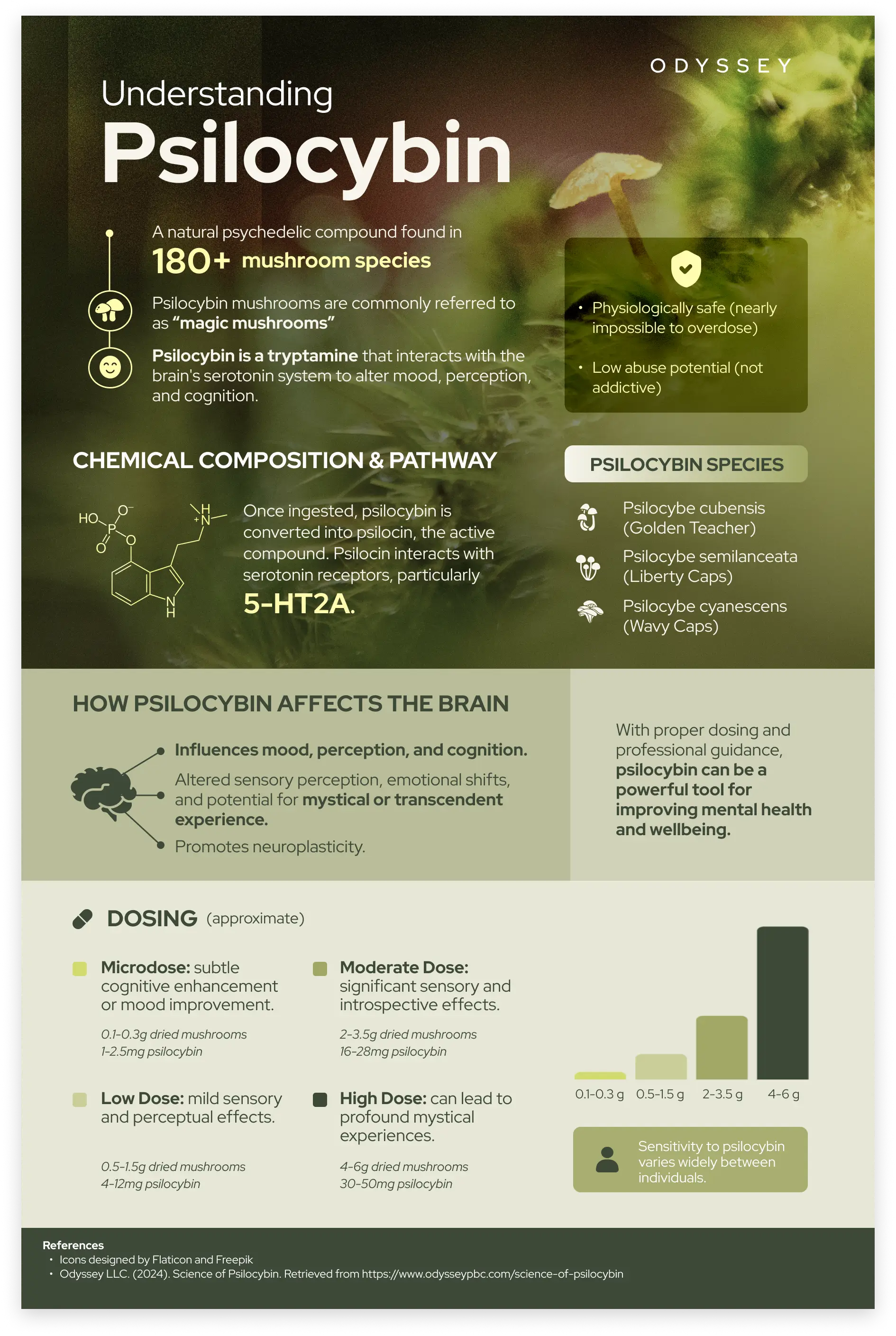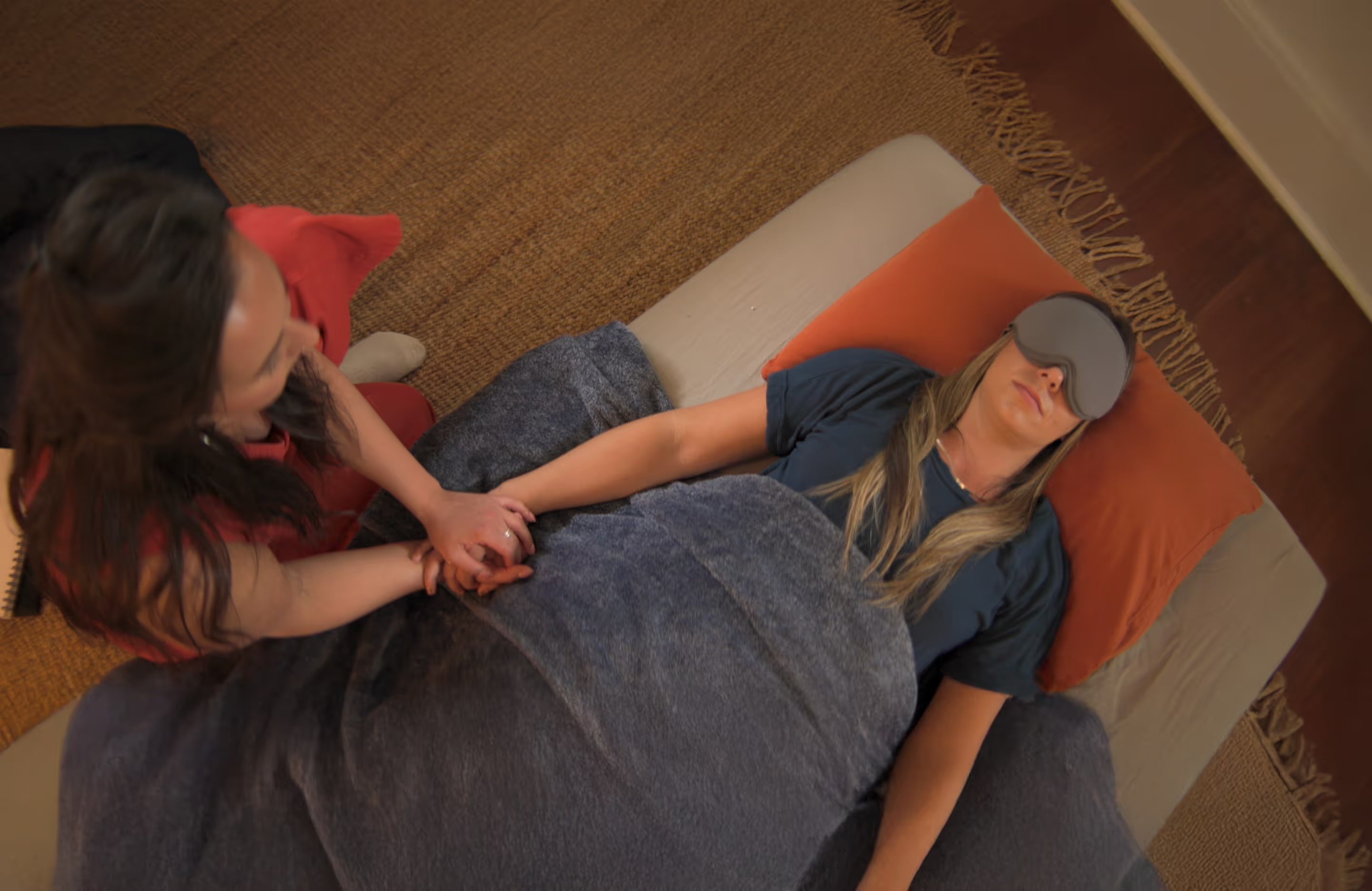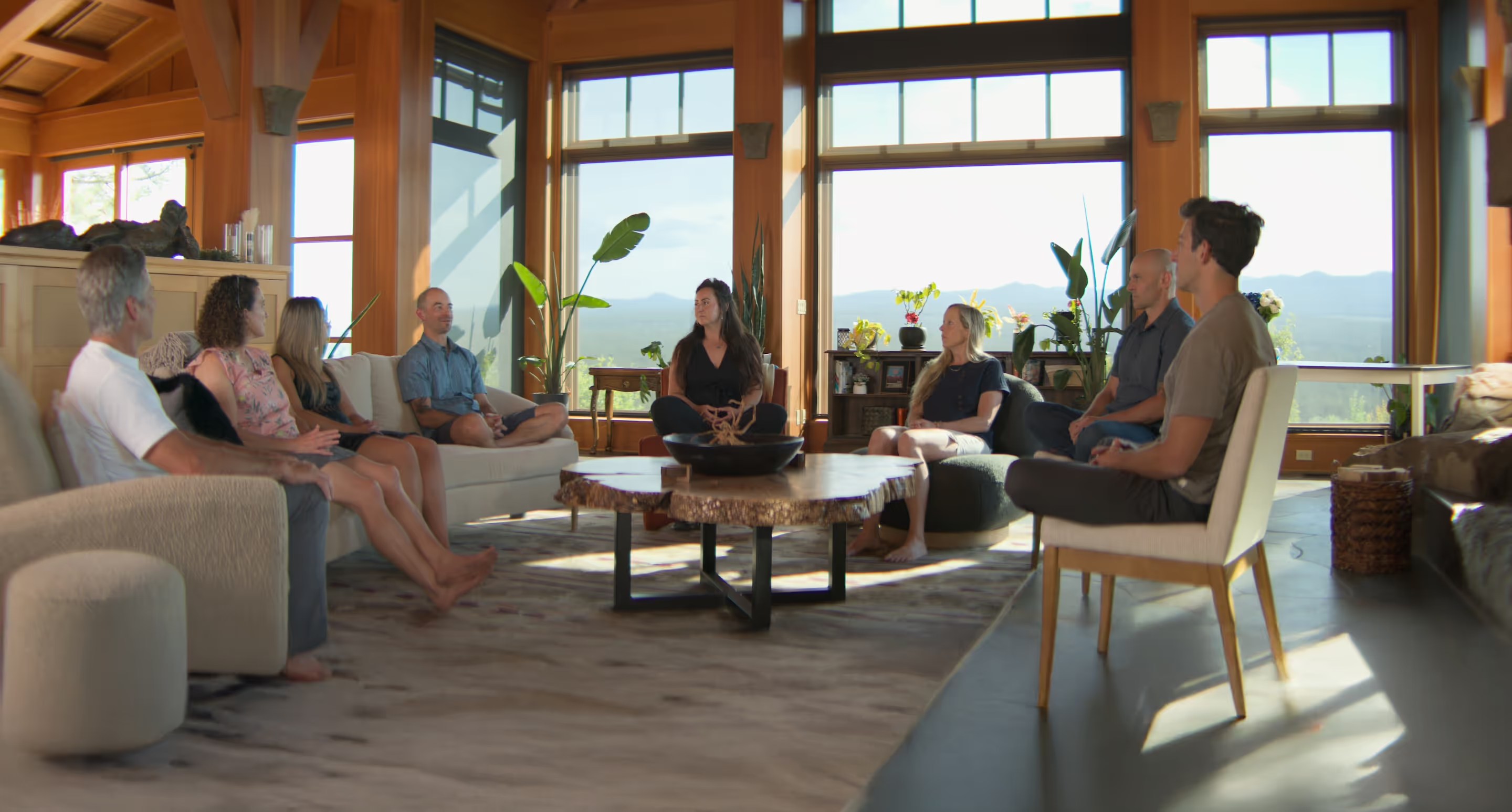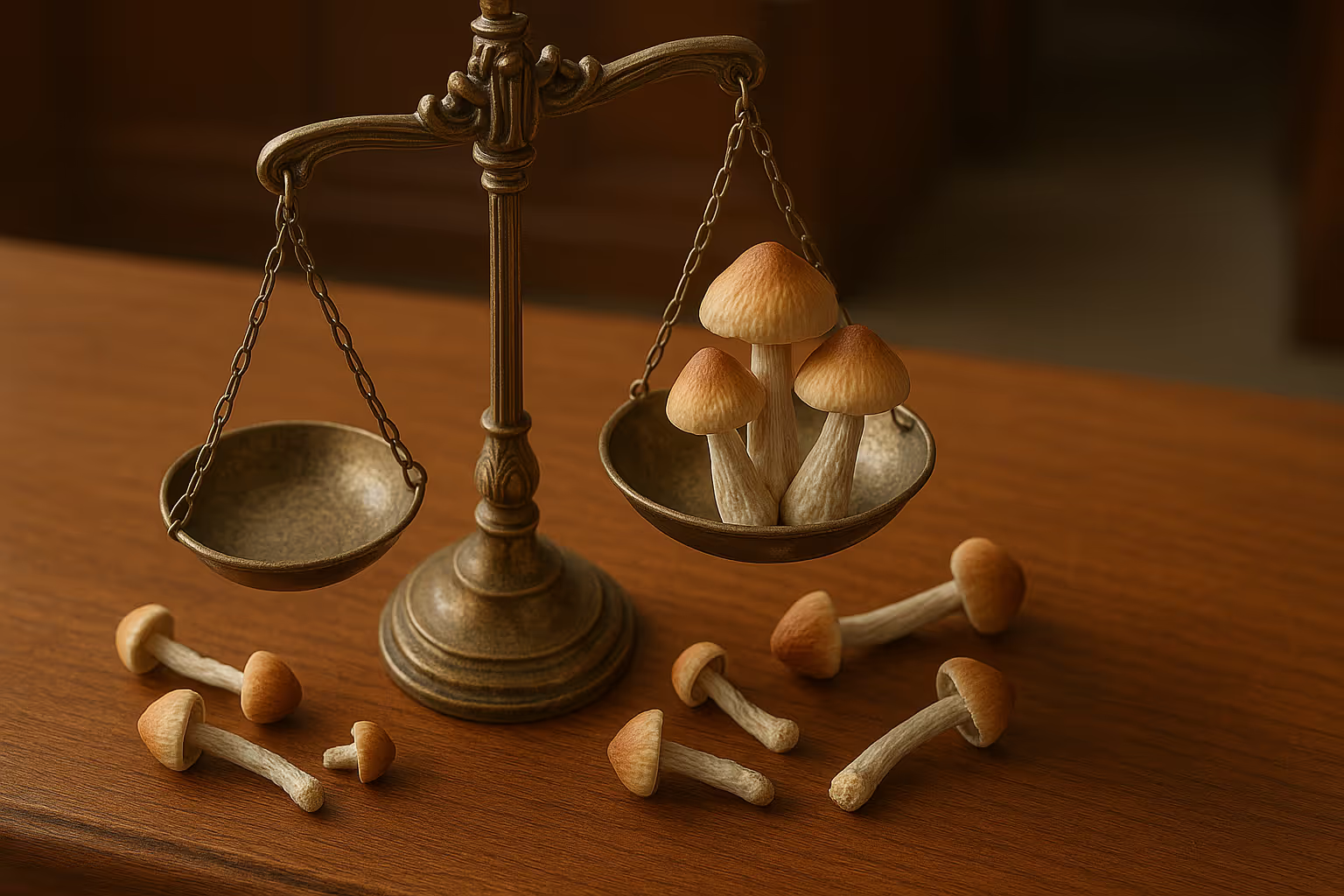Psilocybin Retreats in New York: What to Know

In recent years, New York has seen an uptick in interest around psilocybin retreats as alternative methods for mental health treatment and personal growth continue to gain attention. Psilocybin, the active compound in "magic mushrooms," has been the subject of increasing research, showing potential for therapeutic benefits when used in controlled environments. While still a Schedule I controlled substance in New York, the rising demand for psilocybin retreats reflects a growing desire for healing practices that go beyond traditional therapy.
In this guide, we'll explore the rise of psychedelic therapy in New York, what psilocybin retreats are, how to choose the right retreat for your needs, and what to expect throughout your journey. Whether you're considering psilocybin for mental health support or spiritual exploration, this article will help equip you with the necessary insights to make an informed decision.

The Rise of Psychedelics in New York
Historical Context
New York has long been at the forefront of progressive wellness movements, and the interest in psychedelic therapy is no exception. Although the legal status of psilocybin remains restrictive, alternative therapies, including underground practices and psychedelic retreats, have continued to grow in popularity across the state. These experiences often attract those seeking a deeper form of healing—particularly individuals who have exhausted more conventional mental health treatments.
Historically, psychedelic substances, including psilocybin, have been used in indigenous and spiritual contexts. However, modern science is rediscovering their potential in mental health treatment. Institutions like NYU Langone Health have been at the forefront of psilocybin research, investigating its use in treating conditions such as depression, anxiety, and end-of-life distress. These developments are contributing to the broader acceptance of psychedelic therapy in the state.

Legal Status of Psilocybin in New York
As of February 2025, psilocybin remains classified as a Schedule I controlled substance in New York, aligning with federal law under the Controlled Substances Act. However,, New York State is actively considering legislation to legalize psilocybin-assisted therapy. On January 8, 2025, Senator Nathalia Fernandez introduced Senate Bill S495, which aims to amend the public health law to permit the medical use of psilocybin. The bill proposes the establishment of licensed facilitators authorized to administer psilocybin-assisted therapy to qualified patients, reflecting a growing recognition of psilocybin's potential therapeutic benefits for various mental health conditions.
Lawmakers in New York have expressed optimism about the advancement of psilocybin-related legislation. Senator Jessica Scarcella-Spanton emphasized the importance of providing alternative treatments for mental health conditions, stating that delaying action would neglect individuals in need of help. This sentiment underscores the urgency felt by some legislators to explore psilocybin as a viable therapeutic option.
The proposed legislation in New York draws inspiration from other states that have implemented regulated psychedelic therapy programs. States like Oregon and Colorado have established frameworks for psilocybin services, providing models that balance accessibility with oversight. New York's initiatives aim to create a regulated environment where psilocybin can be used safely and effectively under professional supervision.
Lawmakers in New York have expressed optimism about the advancement of psilocybin-related legislation. Senator Jessica Scarcella-Spanton emphasized the importance of providing alternative treatments for mental health conditions, stating that delaying action would neglect individuals in need of help. This sentiment underscores the urgency felt by some legislators to explore psilocybin as a viable therapeutic option.
Read: Are Mushrooms Legal in New York? What to Know in 2024
What is a Psilocybin Retreat?
Psilocybin retreats are immersive experiences that integrate the use of psilocybin mushrooms for personal growth, emotional healing, and expanded self-awareness. These retreats typically take place in serene, natural settings and are guided by trained facilitators or therapists who ensure that participants can safely navigate their psychedelic journeys.
The retreats offer a unique opportunity to engage in deep introspection, process past traumas, and gain new perspectives on life. In structured, supportive settings, these experiences can help individuals explore the underlying causes of anxiety, depression, and other emotional and mental challenges.
The Psilocybin Experience
Duration and Intensity
The psilocybin experience typically lasts between 4 to 6 hours, though it may feel longer or shorter due to its effects on time perception. Most retreats incorporate preparation and integration sessions around the central psilocybin journey to maximize the benefits. During the peak of the experience, some users report a profound shift in their consciousness, sometimes described as a temporary disconnection from the sense of self, and increased deep emotional and psychological processing.
Potential Benefits
Research continues to explore the wide-ranging benefits of psilocybin for mental health. Clinical studies have highlighted its potential in treating conditions such as depression and treatment-resistant depression (TRD), end-of-life anxiety, post-traumatic stress disorder (PTSD), obsessive-compulsive disorder (OCD), and substance use disorders. In therapeutic settings, a single psilocybin session has been shown to produce long-lasting improvements in mood and emotional well-being.
Read: Psilocybin Therapy for Depression

Legality
As of 2024, psilocybin retreats are not legal in New York. However, they are legal at licensed healing centers in Oregon and are currently being set up in Colorado after the passing of Proposition 122. Get started with Odyssey’s matching form for first access to upcoming evidence-based and professionally-guided psilocybin retreats in both states.
How to Choose a Psychedelic in New York
While psilocybin retreats are currently not legal in New York, understanding how to choose a reputable retreat can help you plan for the future or explore options in legal locations like Oregon and Colorado. Selecting the right magic mushroom retreat is crucial to ensuring a safe, supportive, and transformative experience. For immediate access to legal, evidence-based psilocybin experiences, check out Odyssey.
Factors to Consider
When researching retreats, key factors to consider include the experience and qualifications of the facilitators, the location and environment, safety protocols, and integration support.
- Facilitator Experience: Look for retreats that employ experienced facilitators with backgrounds in therapeutic modalities including psychedelic-assisted therapy. Facilitators with formal training or clinical expertise can provide professional guidance and support throughout the guided psilocybin retreat. Retreats should disclose the qualifications of their staff, who should have experience working with psychedelics in therapeutic settings.
- Setting: The environment plays a significant role in shaping the psychedelic experience. A peaceful, nature-rich setting can enhance the therapeutic effects of psilocybin, providing a calming and supportive atmosphere. Retreats in other states, like Oregon or Colorado, may offer more expansive nature-based settings.
- Safety Protocols: Safety is paramount when embarking on a psychedelic journey. Ensure the retreat you choose has strict safety protocols in place, including screening prior to the session and access to trained professionals in case any challenges arise during the experience.
- Preparation and Integration: Quality retreats will offer comprehensive support, not just during the psilocybin-guided experience, but before and after. Pre-retreat preparation sessions are essential for setting intentions, educating participants on what to expect, and ensuring a positive mindset going into the journey. Post-retreat integration sessions help participants process their experience and apply insights to their everyday lives.
Preparing for a New York Psilocybin Retreat & What to Expect
Safety Screening
Safety protocols can be a central consideration when choosing a psilocybin retreat. Many professional retreats have trained facilitators who offer support throughout the experience, with harm reduction practices that help maintain a controlled environment to reduce potential risks. Clear protocols for emergencies or adverse reactions are also often in place, adding another layer of safety.
Some retreats also prioritize post-experience support, seeing integration as a key component of the healing process. This support can take various forms, such as one-on-one counseling, group sessions, or follow-up therapy, each aimed at helping participants make the most of their experience.
What to Bring
What you pack for a psilocybin retreat depends on the type of experience you're attending. Group retreats that last multiple days typically recommend comfortable clothing, a journal for capturing thoughts and insights, and personal items that promote relaxation, such as a favorite pillow or blanket. Some retreats may also offer items like blindfolds or headphones for use during the session to deepen the sensory experience. Consult with your retreat organizer for a comprehensive list of what to bring.
The Psilocybin Session, Integration, and Follow-Up
The core of the retreat experience is the psilocybin session itself, which typically lasts between four to six hours. Participants are often in a calm and controlled environment, lying down with a blindfold, accompanied by carefully selected music to help them navigate the journey. After the session, many retreats provide integration support, where participants can discuss their experiences and reflect on the insights they gained. Integration sessions are essential for processing what happened during the psilocybin journey and for applying those insights to everyday life. These sessions often extend beyond the retreat, with many participants continuing to reflect and seek guidance long after the initial experience.
Past Odyssey retreat attendees have shared the following about their psilocybin experience:
- “Virtually impossible to find the words to adequately describe the experience. Out of this universe … beyond impactful … filled with powerful emotional meaning and healing. Odyssey curates their guests’ experience with the deepest attention to meaning, sensitivity to each individual, unbounded love and caring, comfort, emotional presence, and passion.” – Jean
- “This experience was life changing in so many ways. It's like giving your soul a chance to be reunited with your body amidst breath taking scenery in a loving, safe environment. I felt like all of the facilitators were highly trained, empathetic, ethical and wonderful listeners. It was well worth the time and financial investment. I may even say it was more affordable than it should have been after seeing all that went in to it.” – Emma
- “This experience, while challenging, was also imbued with a sense of peace, bliss, and a serene calmness that enveloped me in a way I've never felt in my almost 50 years of existence. I experienced an intense feeling of love, a deep connection with my loved ones, and a profound oneness with the world around me.” – Laura
For more on the safety of psilocybin therapy, read The Safety of Psilocybin Therapy.
Conclusion
Psilocybin retreats in New York may emerge as a new way for individuals to explore personal growth and healing. These retreats offer a structured, supportive environment where participants can engage with psilocybin for therapeutic purposes. While psilocybin remains illegal in New York, interest is rising due to its potential to treat mental health challenges like depression and PTSD.
As more states legalize psilocybin use in controlled settings, retreats in nearby areas like Oregon are becoming accessible for New York residents. For those seeking legal, guided sessions, Odyssey can help match individuals to the right psilocybin experience, ensuring safety and personalized support.
As research advances, psilocybin retreats may become a cornerstone of future mental health treatments, offering profound, transformative experiences for those ready to embark on this journey.
FAQs – Psilocybin New York Retreats
Are psilocybin retreats legal in New York?
- No, psilocybin retreats are not currently legal in New York. Psilocybin is classified as a Schedule I controlled substance under both state and federal law. However, there are efforts underway to legalize psilocybin therapy in controlled settings. For those seeking legal retreats, neighboring states like Oregon and Colorado offer such experiences.
What are psilocybin retreats?
- Psilocybin retreats are structured, guided experiences where participants use psilocybin mushrooms in a safe, supportive environment, often for personal growth or healing. These retreats typically include preparation, administration of psilocybin, and integration sessions to help participants process their experience.
What is the legal status of psilocybin in the U.S.?
- Psilocybin is illegal at the federal level as a Schedule I substance, meaning it is considered to have a high potential for abuse and no accepted medical use. However, states like Oregon and Colorado have legalized psilocybin for therapeutic use in certain controlled settings, and other states, like New York, are considering similar legislation.
How do I choose a psilocybin retreat?
- To choose a psychedelic retreat, ensure the facilitators are experienced and knowledgeable, that the setting is safe and supportive, and that the retreat offers preparation and integration sessions. Consider factors such as the retreat's reputation and whether the retreat aligns with your personal goals. For example, there are some retreats for leaders, for healthcare workers, grief, and others.
Can psilocybin help with mental health issues?
- Psilocybin has shown promising results in treating various mental health conditions, including depression, anxiety, PTSD, and addiction. Research suggests that psilocybin therapy can lead to long-lasting improvements in mental health, particularly when administered in a controlled, therapeutic setting.
How do I find a psychedelic retreat near me?
- Currently, the only legal psilocybin retreats are in Oregon and Colorado, where psilocybin has been decriminalized for therapeutic use. You can explore retreat options by researching reputable centers in these states that offer guided experiences. Odyssey, for example, offers legal, evidence-based psilocybin-assisted group retreats and private sessions. Their services include preparation, integration support, and a safe, professionally guided experience designed to promote healing and personal growth.
How do I find a psilocybin retreat near me?
- To find the best psilocybin retreat near you, focus on legal regions like Oregon and Colorado, where therapeutic psilocybin use is permitted. Research centers offering safe, evidence-based retreats with professional guides.

.svg)









.svg)